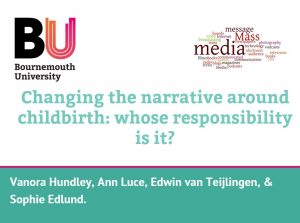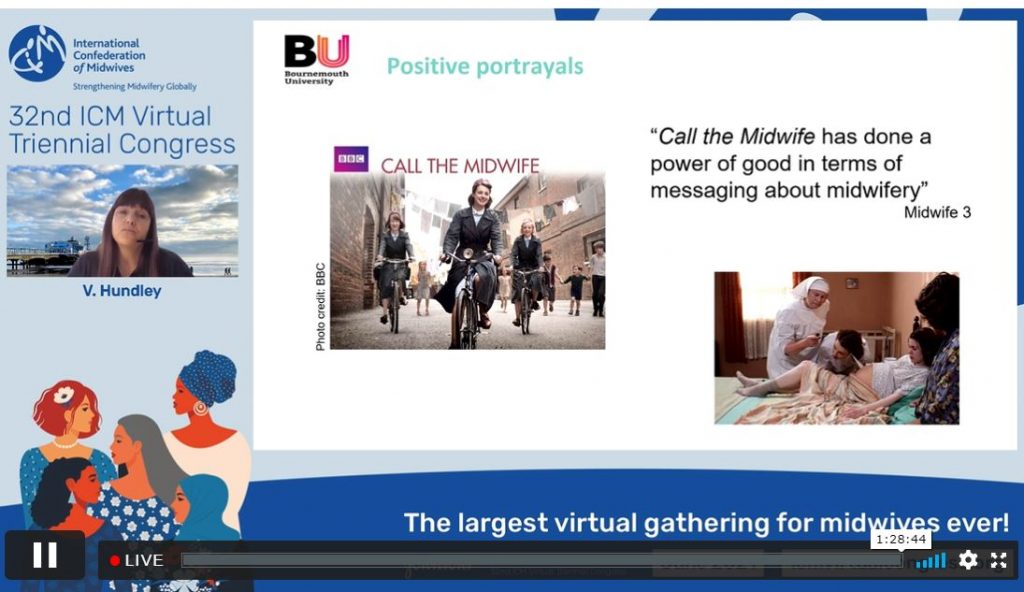 Today Prof. Vanora Hundley, based in the Faculty of Health & Social Sciences, gave a well-received presentation on ‘Changing the narrative around childbirth: whose responsibility is it?’ at the 32nd ICM (International Confederation of Midwives) Virtual Triennial Congress. Prof. Hundley presented online a BU collaboration published in the journal Evidence-based Midwifery [1]. This presentation is part of a larger body of interdisciplinary work between media and heatlh scholars at Bournemouth University [see 2-6].
Today Prof. Vanora Hundley, based in the Faculty of Health & Social Sciences, gave a well-received presentation on ‘Changing the narrative around childbirth: whose responsibility is it?’ at the 32nd ICM (International Confederation of Midwives) Virtual Triennial Congress. Prof. Hundley presented online a BU collaboration published in the journal Evidence-based Midwifery [1]. This presentation is part of a larger body of interdisciplinary work between media and heatlh scholars at Bournemouth University [see 2-6].
The finding that UK midwives fear the media resonates with experiences from many other countries and professional groups. There is a need to change media discourse in fictional and factual representations of childbirth, and midwives have a critical role to play in this, but to do this they need to equip themselves with the skills necessary to engage with the media. Guidelines on responsible media reporting could ensure that media producers portray pregnancy, midwifery
and maternity care as naturally as possible.
- Hundley, V., Luce, A., van Teijlingen, E., Edlund, S. (2019) Changing the narrative around childbirth: whose responsibility is it? Evidence-based Midwifery 17(2): 47-52.
- Luce, A., Hundley, V., van Teijlingen, E. (Eds.) (2017) Midwifery, Childbirth and the Media, London: Palgrave Macmillan [ISBN: 978-3-319-63512-5].
- Luce, A., Cash, M., Hundley, V., Cheyne, H., van Teijlingen, E., Angell, C. (2016) “Is it realistic?” the portrayal of pregnancy and childbirth in the media BMC Pregnancy & Childbirth16: 40 http://bmcpregnancychildbirth.biomedcentral.com/articles/10.1186/s12884-016-0827-x
- Angell, C. (2017) An Everyday Trauma: How the Media Portrays Infant Feeding, In: Luce, A. et al. (Eds.) Midwifery, Childbirth and the Media, London: Palgrave Macmillan pp: 45-59.
- Hundley, V., Duff, E., Dewberry, J., Luce, A., van Teijlingen, E. (2014) Fear in childbirth: are the media responsible? MIDIRS Midwifery Digest24(4): 444-447.
- Hundley, V., Luce, A., van Teijlingen, E. (2015) Do midwives need to be more media savvy? MIDIRS Midwifery Digest25(1):5-10.












 Expand Your Impact: Collaboration and Networking Workshops for Researchers
Expand Your Impact: Collaboration and Networking Workshops for Researchers Visiting Prof. Sujan Marahatta presenting at BU
Visiting Prof. Sujan Marahatta presenting at BU 3C Event: Research Culture, Community & Can you Guess Who? Thursday 26 March 1-2pm
3C Event: Research Culture, Community & Can you Guess Who? Thursday 26 March 1-2pm UKCGE Recognised Research Supervision Programme: Deadline Approaching
UKCGE Recognised Research Supervision Programme: Deadline Approaching ECR Funding Open Call: Research Culture & Community Grant – Apply now
ECR Funding Open Call: Research Culture & Community Grant – Apply now ECR Funding Open Call: Research Culture & Community Grant – Application Deadline Friday 12 December
ECR Funding Open Call: Research Culture & Community Grant – Application Deadline Friday 12 December MSCA Postdoctoral Fellowships 2025 Call
MSCA Postdoctoral Fellowships 2025 Call ERC Advanced Grant 2025 Webinar
ERC Advanced Grant 2025 Webinar Update on UKRO services
Update on UKRO services European research project exploring use of ‘virtual twins’ to better manage metabolic associated fatty liver disease
European research project exploring use of ‘virtual twins’ to better manage metabolic associated fatty liver disease